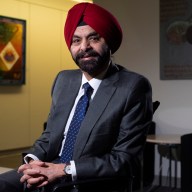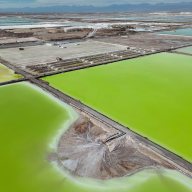TORONTO – Michael McCain’s response to the listeriosis outbreak that killed 20 Canadians this summer showed both genuine compassion and cutthroat business sense, and helped Maple Leaf Foods Inc. (TSX:MFI) emerge relatively unscathed from one of the worst food-borne illness outbreaks in Canadian history.
That public health disaster turned business success story has made the Maple Leaf CEO Canada’s 2008 Business Newsmaker of the Year, as chosen in an annual survey of editors and broadcasters by The Canadian Press.
McCain garnered 44 of 125 votes cast in the business newsmaker survey, followed by Conrad Black with 29 and Finance Minister Jim Flaherty, with 25.
Shortly after dozens of cases of listeriosis were linked to cold cuts produced at Maple Leaf’s Toronto plant on Aug. 23, McCain appeared in a television ad to issue a candid and abject apology for the outbreak.
“We have an unwavering commitment to keeping your food safe with standards well beyond regulatory requirements, but this week our best efforts failed and we are deeply sorry,” a weary and upset-looking McCain said.
His apology could not have seemed more personal or heartfelt. And he was widely praised at the time for promptly recalling any products produced at the Toronto plant, even if those products hadn’t been linked to listeriosis in any way.
But he insists he was simply acting as the “face” for the entire Maple Leaf organization, Canada’s largest food processor, with 23,000 employees around the world, and well-known products ranging from Burns and Maple Leaf cold cuts to Dempster’s bread and Olivieri pasta.
The company, formed in the early 1990s through the merger of bread maker Maple Leaf Mills and meat processor Canada Packers, was taken over by the McCain family and other investors in the mid-1990s.
That deal came after Michael McCain’s father Wallace left the privately owned New Brunswick company he helped run for decades – french fry giant McCain Foods – following a corporate dispute with his brother Harrison.
“I work beside some very capable, committed, passionate people and this just isn’t about me personally, it’s about our organization and the accountability that we take together,” McCain said in an interview with The Canadian Press.
“Obviously, I have the pinnacle of that accountability and act as the face of the organization, but this was a very dedicated, principled team of leaders, all 23,000 of them, and we acted together through this.”
In his characteristically humble fashion, McCain, 50, refused to take credit for the success of his company’s response to the outbreak and declined even to refer to it in terms of success or failure.
“We would be thankful if we can fully recover our business and we’re optimistic we can earn that trust back from consumers, but these types of things rarely should be described in terms of success or similar adjectives, because this is just an outright tragedy,” he said.
“I think all 23,000 people in our organization felt that way about it, but equally had a resolve to make a terrible wrong right in some meaningful way.”
There is no doubt Maple Leaf Foods suffered a serious blow as a result of the outbreak and the resulting recall of hundreds of its products. Sales of the Maple Leaf brand declined by up to 35 per cent following the recall, which wiped out 94 per cent of the operating profits of the company’s meat division for its third quarter.
It is estimated the outbreak and recall cost the company between $25 million and $30 million, plus another $15 million in lost sales. The company’s stock also took a beating, falling as low as $6.54 in October from a high of $15 in January, before rebounding to the $10 range in December.
But McCain, who became CEO of Maple Leaf in 1998, said the steps the company has taken since the outbreak to become an industry leader in food safety are helping to win back consumer confidence in the Toronto company.
According to data collected by the company, consumers’ intent to purchase Maple Leaf brand products dipped as low as 64 per cent immediately following the recall, but had rebounded to 91 per cent by early December.
David Dunne, a marketing professor at the University of Toronto’s Rotman School of Management, said it was McCain’s candour in addressing the outbreak and the steps he has taken since to underscore the company’s commitment to food safety – including the appointment of a chief food safety officer – that helped Maple Leaf win consumers back so quickly.
“A lot of what they did was technically perfect,” Dunne said.
“I think they’ve done as much as could be done, and it’s a real example to other companies that face crises. Most companies are way too slow to deal with these things and tend to hide and they’re afraid of admitting responsibility and so on, so this is a real example of how to do it right.”
In voting for McCain, broadcast news directors and newspaper and online editors across the country praised his honesty and forthrightness.
“His candour at a time when his contemporaries would have scurried behind spin doctors and legal eagles was a refreshing way to address a potentially devastating mistake. I actually trust the man!” said Peter Lapinskie of the Daily Observer in Pembroke, Ont.
“It’s so rare to see a white-collar executive descend from the ivory tower, apologize and reach out to the public in such plain language,” agreed Ruth Davenport of CJNI radio in Halifax.
“The Listeria crisis was a headline story in and of itself, but McCain’s sincerity in trying to reach out to the victims and consumers elevated it even further.”
But McCain’s response showed more than just sincerity, said Dunne. It also showed a business savvy that recognized the danger of waiting too long to respond to the crisis and took a page from other successful corporate reactions to public health disasters.
Dunne compared Maple Leaf’s response to that of Johnson & Johnson, one of the world’s biggest makers of health and consumer products, when seven people in the Chicago area died after taking cyanide-laced capsules of Extra-Strength Tylenol in 1982.
At the time, experts predicted that the brand would never recover, but within a year Johnson & Johnson had almost entirely regained its former share of the painkiller market.
The company’s chairman, James Burke, was praised for initiating the extensive recall, which removed 31 million bottles of Tylenol from store shelves, and for his openness in discussing the situation with the public and the media.
“As long as 1/8Maple Leaf 3/8 doesn’t have another incident, they should be through this in a matter of months,” Dunne said.
McCain continued to show the same business acumen when Maple Leaf chose to settle a series of proposed class-action lawsuits out of court in December, agreeing to pay the victims of the outbreak as much as $27 million.
“In the scheme of things, the value of the Maple Leaf brand is worth way more than $27 million over time, so (I’m not surprised) they would settle this quietly and reasonably quickly so it wouldn’t go to court,” Dunne said.
“It would have been quite damaging had they remained in the news for a long time over this.”
McCain said settling the lawsuit was part of understanding that “you can’t accept accountability without accepting a consequence.”
He said that, although Maple Leaf has always been committed to food safety, the listeriosis outbreak helped to “underpin” that commitment.
“We believe pretty deeply that it’s not the mistakes you make in life that count, it’s how you deal with those mistakes that makes a difference,” McCain said.













